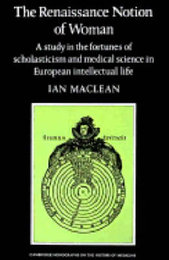
|
The Renaissance Notion of Woman: A Study in the Fortunes of Scholasticism and Medical Science in European Intellectual Life
Paperback / softback
Main Details
| Title |
The Renaissance Notion of Woman: A Study in the Fortunes of Scholasticism and Medical Science in European Intellectual Life
|
| Authors and Contributors |
By (author) Ian Maclean
|
| Series | Cambridge Studies in the History of Medicine |
|---|
| Physical Properties |
| Format:Paperback / softback | | Pages:128 | | Dimensions(mm): Height 225,Width 150 |
|
| Category/Genre | World history - c 500 to C 1500 |
|---|
| ISBN/Barcode |
9780521274364
|
| Classifications | Dewey:301.412 |
|---|
| Audience | | Tertiary Education (US: College) | | Professional & Vocational | |
|---|
| Illustrations |
Worked examples or Exercises
|
|
Publishing Details |
| Publisher |
Cambridge University Press
|
| Imprint |
Cambridge University Press
|
| Publication Date |
17 March 1983 |
| Publication Country |
United Kingdom
|
Description
This study of the world of scholarship and scholarly texts in the Renaissance, the so-called respublica literaria, affords insights into the intellectual infrastructure and modes of thought of the period by its examination of contemporary attitudes towards women. It addresses the questions: What is the notion of woman to be found in Renaissance texts, and how does it evolve? What is the relationship between the notion of woman and that of sex difference, and how is sex difference related in turn to other differences and to the concept of difference itself? Theology, medicine, ethics, politics, and law are examined in succeeding chapters. The threads of the investigation are then drawn together and Dr Maclean shows how the notion of woman was influenced by both forces of conservatism and forces which fostered change, forces which were to be found both inside the confines of intellectual life and beyond them. The final section offers a context for the understanding of European Renaissance feminism and sketches its connections with social and political evolution, humanist scholarship, religious thought and finally problems of language and expression.
Reviews'Ian Maclean has done a signal service to the study of the sexes and of learned thought more generally in his pithy book ... it adds immeasurably to the rigor, depth, and scholarship of the argument about women and provides remarkable insight into the connections among the disciplines in a century of proliferating academic production.' Renaissance Quarterly
|